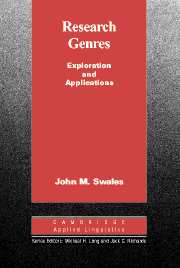Book contents
- Frontmatter
- Contents
- Series editors' preface
- Acknowledgments
- Chapter 1 Toward a world of genre
- Chapter 2 The role of English in the research world
- Chapter 3 Theoretical and methodological issues
- Chapter 4 “Getting done”: The Ph.D. dissertation
- Chapter 5 The Ph.D. defense
- Chapter 6 Research talk and research talks
- Chapter 7 The research article revisited
- Chapter 8 Three remaining issues
- Appendix
- Notes
- References
- Author index
- Subject index
Chapter 8 - Three remaining issues
Published online by Cambridge University Press: 05 October 2012
- Frontmatter
- Contents
- Series editors' preface
- Acknowledgments
- Chapter 1 Toward a world of genre
- Chapter 2 The role of English in the research world
- Chapter 3 Theoretical and methodological issues
- Chapter 4 “Getting done”: The Ph.D. dissertation
- Chapter 5 The Ph.D. defense
- Chapter 6 Research talk and research talks
- Chapter 7 The research article revisited
- Chapter 8 Three remaining issues
- Appendix
- Notes
- References
- Author index
- Subject index
Summary
In this closing chapter, I will offer some reflections on three issues that continue to be important in any applied endeavor involving research genres. The first issue concerns cross-cultural and cross-linguistic similarities and differences in research rhetoric. Here I will focus less on the differences themselves than on the origins of those differences, because it is there I believe that future investigations should be concentrated. In so doing, I also will have something to say about the kinds of structural models that might be appropriate. The second set of issues revolves around the debate, originally initiated by Santos (1992) and quickly responded to by Johns (1993), about whether and to what extent those in the EAP and ERP fields should be “critical” rather than “accommodationist” in their pedagogical and curricular enterprises. To what extent, in other words, should we be preparing JRs for their chosen research worlds as they are currently constructed, and to what extent should we be preparing them to question existing norms and conventions? And finally, as we move further into the twenty- first century, I comment a little more explicitly on my own experiences with using machine-readable corpora for investigating research genres and then bringing the fruits of those investigations to my international students.
One further issue that might have been expected would be the justifi- cation for a genre-based approach per se. In one sense, if I have not been able to make a reasonable and rational case for such an approach in the preceding chapters, then there is little I can do now.
- Type
- Chapter
- Information
- Research GenresExplorations and Applications, pp. 241 - 258Publisher: Cambridge University PressPrint publication year: 2004

